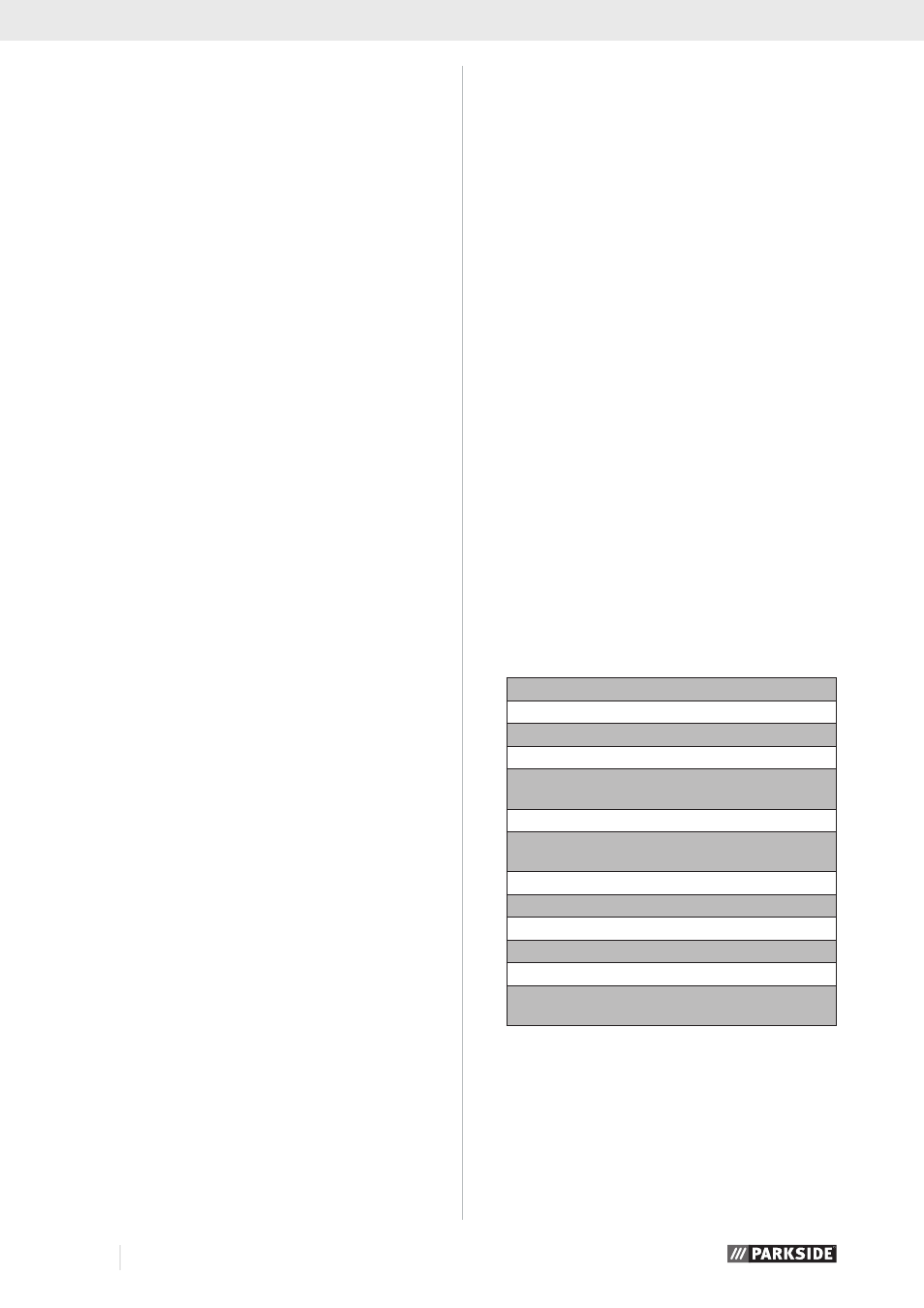Additional safety instructions, Technical data – Parkside PKO 270 A1 User Manual
Page 9

4
GB/IE/CY
17 Noise
–
Wear ear muffs when you use the compressor.
18 Replacing the power cable
–
To prevent hazards, leave the replacement of
damaged power cables strictly to the manufac-
turer or a qualified electrician. There is a risk of
electric shock!
19 Inflating tires
–
Directly after inflating tires, check the pressure
with a suitable pressure gauge, for example at
your filling station.
20 Roadworthy compressors for building site opera-
tions
–
Make sure that all lines and fittings are suitable
for the maximum permissible operating pressure
of the compressor.
21 Place of installation
–
Set up the compressor on an even surface.
ADDITIONAL SAFETY INSTRUCTIONS
Safety instructions for working with compressed
air and blasting guns
• The compressor pump and lines can become very hot
during operation. Touching these parts will burn you.
• The air which is sucked in by the compressor must
be kept free of impurities that could cause fires or
explosions in the compressor pump.
• When releasing the hose coupling, hold the hose
coupling piece with your hand. This way, you can
protect yourself against injury from the rebounding
hose.
• Wear safety goggles when working with the blow-
out pistol. Foreign bodies or blown off parts can
easily cause injuries.
• Do not blow at people with the blow-out pistol and do
not clean clothes while being worn. Risk of injury!
Safety information for paint spraying
• Do not process any paints or solvents with a flash point
below 55° C. There is a risk of explosion!
• Do not heat up paints or solvents. There is a risk of
explosion!
• If hazardous liquids are processed, wear protective
filter units (face guards). Also, adhere to the safety
information provided by the manufacturers of such
liquids.
• The details and designations of the Ordinance on
Hazardous Substances, which are displayed on the
outer packaging of the processed material, must be
observed.
• Additional protective measures are to be undertaken if
necessary, particularly the wearing of suitable clothing
and masks.
• Do not smoke during the spraying process and/or in
the work area. There is a risk of explosion! Paint vapors
are easily combustible.
• Never set up or operate the equipment in the vicinity of
a fire place, open lights or sparking machines.
• Do not store or eat food and drink in the work area.
Paint vapors are harmful to your health.
• The work area must exceed 30 m3 and sufficient
ventilation must be ensured during spraying and drying.
Do not spray against the wind. Always adhere to the
regulations of the local police authority when spraying
combustible or hazardous materials.
• Do not process media such as white spirit, butyl alcohol
and methylene chloride with the PVC pressure hose.
These media will destroy the pressure hose.
Operating pressure vessels
•
You must keep your pressure vessel in good working
order, operate the vessel correctly, monitor the vessel,
carry out necessary maintenance and repair work im-
mediately and meet the relevant safety precautions.
•
The supervisory authority may enforce essential con-
trol measures in individual cases.
•
A pressure vessel is not allowed to be used if it has
faults or deficiencies that can endanger workers or
third parties.
•
Check the pressure vessel for signs of rust and dama-
ge each time before using. Do not use the compressor
with a damaged or rusty pressure vessel. If you dis-
cover any damage, then please contact the customer
service workshop.
Do not lose these safety instructions
6. Technical data
Mains connection
230 V ~ 50 Hz
Motor rating W
1800
Operating mode
S1
Compressor speed min
-1
2850
Pressure vessel capacity
(in liters)
24
Operating pressure
approx. 8 bar
Theoretical intake capaci-
ty (l/min)
approx. 270
sound power level L
WA
97 dB(A)
uncertainty K
WA
4 dB
Protection type
IP20
Weight of the unit in kg
26
Oil (15W 40) l
0,3
Max. altitude (above mean
sea level)
1000 m
The noise emission values were measured in accord-
ance with EN ISO 2151.
Wear hearing protection.
The effects of noise can cause a loss of hearing.
